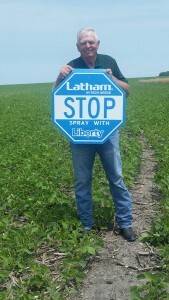 Throughout the growing season, we’ve talked about how keeping good field notes helps farmers select the best seed for each of their fields. One challenge that many farmers across the Upper Midwest have encountered this season is weed pressure. Waterhemp and ragweed, in particular, are showing resistance to glyphosate. That’s why it’s so important to put a weed management strategy in place.
Throughout the growing season, we’ve talked about how keeping good field notes helps farmers select the best seed for each of their fields. One challenge that many farmers across the Upper Midwest have encountered this season is weed pressure. Waterhemp and ragweed, in particular, are showing resistance to glyphosate. That’s why it’s so important to put a weed management strategy in place.
Weed specialists like Dr. Mike Owen at Iowa State University say that “diversity of tactics” is key to combatting weeds. One such tactic involves using different modes of action, or switching from glyphosate to glufonsinate herbicides. LibertyLink soybeans are the only non-selective option on the market to combat glyphosate-resistant weeds and break the cycle of continuous glyphosate use.
Liberty is effective for control of many ALS- and glyphosate-resistant weeds, including waterhemp, marestail and common and giant ragweed. Using residual herbicides can reduce weed populations, slow weed growth and provide flexibility in the post-emergence application window. Make sure you apply Liberty post-emergence at the proper time, according to weed size, and use the full recommended rate.
Many of our customers have achieved their best soybean yields ever with Latham’s Liberty soybeans. (Side bar: Latham Hi‑Tech Seeds released its first LibertyLink soybeans in 2009, so there’s no need to worry about yield drag!) Several customers have told us all growing season long that they’re impressed by the weed control they’ve seen this season and are eager to see yield results from #harvest15.
With so much concern about weed resistance, an industry-wide shortage of LibertyLink soybeans is expected. We have seen demand double for LibertyLink Soybeans each of the past two sales years, so we increased production of our LibertyLink soybean brands for 2016 planting.
Another major concern this growing season has been soybean diseases. Latham® IRONCLADTM offer the industry’s strongest defensive package to combat Soybean Cyst Nematodes (SCN), Iron Deficiency Chlorosis (IDC), Phytopthora Root Rot, Brown Stem Rot (BSR), Sudden Death Syndrome (SDS) or White Mold.
Selecting seed is one of the single most important decisions a farmer makes each year. That’s why we work with farmers to get the right seed for each particular field. As an independent, family-owned company, Latham Seeds’ top priority is helping farmers select the best possible products – regardless of whether the traits came from Monsanto, Dow or Syngenta. Contact your local Latham® representative by October 15th for the best pricing and availability.
